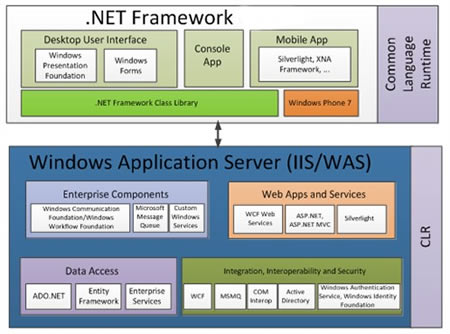Difference between Java and .NET
Key difference: Java and .NET are known programming languages. These languages belong to different platforms, Java is a Oracle Trademark, and Oracle licensed software programming language, whereas .NET is a Microsoft's CLI executable environment and programming language. These languages form the backbone in the software and information technologies.
 Java is a famous open source programming language product of Oracle trademark. In June 1991, James Gosling, Mike Sheridan, and Patrick Naughton initiated the Java language project. In 1995, Sun Microsystems released the first public implementation as Java 1.0. Oracle provides it with the free and open source platform which comprises of JDK (Java Development Kit). It works on the application of "write once, Run anywhere" (WORA), which means that the code runs on one platform and further does not need to be recompiled to run on another. It was rated as the top programming languages of 2012 series. Sun has also re-licensed most of its Java technologies under the GNU General Public License.
Java is a famous open source programming language product of Oracle trademark. In June 1991, James Gosling, Mike Sheridan, and Patrick Naughton initiated the Java language project. In 1995, Sun Microsystems released the first public implementation as Java 1.0. Oracle provides it with the free and open source platform which comprises of JDK (Java Development Kit). It works on the application of "write once, Run anywhere" (WORA), which means that the code runs on one platform and further does not need to be recompiled to run on another. It was rated as the top programming languages of 2012 series. Sun has also re-licensed most of its Java technologies under the GNU General Public License.
Java is a software programming languages, which is wholly object-oriented, concurrent and class-based in features. It is particularly designed for the few implementation dependencies. The java applications are compiled to bytecodes that are basically the class files which run on any Java virtual machine (JVM). Java compilers, virtual machines, and class libraries are the most important components of the programming language. Java is platform independent language and is known for its portability, i.e. the language and can run on any hardware/operating-system or platform. The Java bytecode, are converted into platform-specific machine code. These are interpreted by the JVM (Java Virtual Machine), and are written in JRE (Java Runtime Environment). JRE need to be installed separately in order to run the Java application.
The Java language creation is based on five most primary goals, that is:
- It should be "simple, object-oriented and familiar"
- It should be "robust and secure"
- It should be "architecture-neutral and portable"
- It should executed with "high performance"
- It should be "interpreted, threaded, and dynamic"
 .NET is the most upcoming and advanced programming language in the computer and IT sectors. Initially, Microsoft developed the .NET Framework in the late 1990s, and named it originally as, Next Generation Windows Services (NGWS). Its first beta version, .NET 1.0 was released in late 2000s.
.NET is the most upcoming and advanced programming language in the computer and IT sectors. Initially, Microsoft developed the .NET Framework in the late 1990s, and named it originally as, Next Generation Windows Services (NGWS). Its first beta version, .NET 1.0 was released in late 2000s.
.NET framework usually pronounced as dot net, is a computer software framework invented by Microsoft, and runs primarily on the Microsoft Windows OS (Operating Systems). Its Framework's Base Class Library facilitates user interface, data access, database connectivity, cryptography, web application development, numeric algorithms, and network communications features. The language includes a large library and is known to provide the language interoperability (which means each language can use code written in other languages) across several programming languages. .NET provides a software environment for the executable .NET Framework programs. The language also includes a hardware environment, known as the Common Language Runtime (CLR), which is an application virtual machine. The .NET Framework is composed of class library and CLR. The .NET developers produce software by combining their own source code with .NET Framework and other libraries. The language is now applicable in most of the recent developed applications like mobile, android, tablets and etc.
Its Design features include:
- Interoperability
- Common Language Runtime engine
- Language independence
- Simplified deployment
- Security
- Portability
Comparison between Java and .NET:
|
|
Java |
.NET |
|
Web definitions |
Java is a computer programming language that is concurrent, class-based, object-oriented, and specifically designed to have as few implementation dependencies as possible. |
The .NET Framework is a software framework developed by Microsoft that runs primarily on Microsoft Windows. It includes a large library and provides language interoperability across several programming languages |
|
Inventors |
Oracle and Sun Microsystem |
Microsoft |
|
Supports |
Java supports only Java simple code and programming patterns. |
.NET is a runtime framework that supports multiple languages, Visual Basic and C#. |
|
Runs on |
Java is platform independent, that is, it runs on several operating systems including Windows, Mac and Linux. |
.NET is primarily for Windows. |
|
Virtual machines |
Here, JVM (Java Virtual Machine) converts the bytecode into machine code. |
Here, Microsoft's virtual machine, converts the bytecode to machine code. |
|
Important components |
It comprises of JVM, JRE, JDK, Java Applets, java script and Swings. |
It comprises of .NET framework, composed of Common Language Runtime (CLR), virtual machine, and various applicative binary libraries. |
|
Garbage cleaning facility |
The Java provides a good Garbage cleaning facility as compared to. NET. |
The Garbage cleaning facility is not that efficient in .NET as compared to Java. |
|
Extra features |
There are no such extra features available in Java. |
In .Net, a standard development IDE (Microsoft Visual Studio) is available. |
|
Versions |
JDK Alpha and Beta JDK 1.0 JDK 1.1 J2SE 1.2 J2SE 1.3 |
.NET Framework 1.0 .NET Framework 1.1 .NET Framework 2.0 .NET Framework 3.0 .NET Framework 3.5 |
|
File Extensions |
java, .jav, .jad, .jar, .jsp, .class |
.asax, .ascx, .ashx, .asmx, .aspx |
Image Courtesy: cs.uky.edu, java.interoperabilitybridges.com









Comments
Very helpful indeed...thanx it helped...(y)
Sujit Sharma
Wed, 04/30/2014 - 16:47
Add new comment